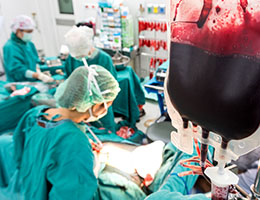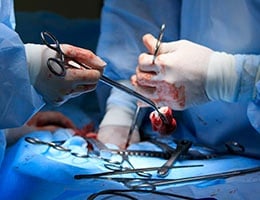Blog & Articles
Ron Savrin
Recent Posts
Surgery Malpractice: Are Surgeons More Prone to Complaints?

[7 MIN READ]
Among physicians, surgeons are at increased medico-legal risk compared to non-surgeons; they also have more medical malpractice claims and claims paid per year. Jena et al.1 found that the probability of facing a claim varied from 15.3% in general surgery to only 5.2% in family general practice. In a recent review of National Practitioner Data Bank (NPDB) records, Schaffer et al.2 noted that the number of paid claims per 1,000 physician years was 30.0 for general surgeons and only 7.1 for internal medicine. Although there are a number of factors responsible for this wide variation, the correlation between the physician-patient relationship and the risk of a medical malpractice suit is well established.
A recent study by Tibble et al.3 explored the incidence and classification of complaints about physicians, finding that surgeons attracted 2.3 times as many complaints as non-surgeon physicians. Although the thrust of the article remains valid and the implications are concerning, there are a few factors that modify the severity of the concern.
Surgical Error Cases

[8 MIN READ]
We are all fallible. Despite their best efforts, physicians, nurses, other healthcare workers, and indeed all humans, make errors. It is an essential component of our being. It is widely accepted that a systems approach to error prevention can counteract this fallibility. Nonetheless, errors do occur. These failures can often be explained by the “Swiss Cheese Model” of error. Multiple processes are designed to prevent a type of error. Each individual process may be imperfect but used in combination one process will succeed where another may fail. Like the holes in Swiss cheese, when these imperfections are aligned and multiple processes fail, errors occur.
Below I present three cases from which we can gain perspective on how poor communication, systems errors, and cognitive bias contribute to surgical errors.
Informed Consent Process Forms & Documentation

[7 MIN READ]
Obtaining the informed consent of the patient is required in all states before an invasive procedure that carries a material risk of harm is performed.
This is a non-delegable duty of the practitioner who is going to perform the procedure; this means that the practitioner is ultimately responsible for the validity of the consent and cannot avoid liability by claiming that it was someone else’s responsibility.
However, obtaining informed consent should not be construed to be an obstacle. Obtaining informed consent can be a mechanism for reconciling the expectations of all parties involved.
Surgical Errors

[7 MIN READ]
The care of the surgical patient is dependent upon doctors, nurses, technicians and both office and hospital staff. Like all humans, despite their best efforts, they make mistakes. Encouraging them to “try harder” simply will not work.
To reduce surgical errors we need to identify root causes and institute system-based processes to prevent them.
Studies have suggested specific areas that offer opportunities for improvement. Kim et al.[1] noted that adverse events from surgical intervention are more commonly due to preoperative and/or postoperative errors. These include delay in diagnosis and/or treatment and communication errors between the healthcare team and the patient/family or other members of the healthcare team. Process measures that can address these issues include:
Wrong Site Surgery Statistics

[6 MIN READ]
The Joint Commission (TJC) defines a Sentinel Event as “a patient safety event (not primarily related to the natural course of the patient’s illness or underlying condition) that reaches a patient and results in any of the following: death, permanent harm, or severe temporary harm and intervention required to sustain life.” TJC adopted a Sentinel Event Policy in 1996 in an effort to assist hospitals in voluntarily reporting, evaluating and reducing risk, and preventing patient harm. The term “never event” was first described in 2001 by Dr. Kenneth Kizer of The National Quality Forum (NQF) in reference to significant adverse medical errors that should never have taken place. The NQF currently uses this term when referring to serious reportable events deemed preventable. Whatever you choose to call these, they are simply events that really should not happen.
Retained Surgical Sponge: Never Means NEVER!

[4 MIN READ]
The Problem
The term “Never Events” was used in 2001 to describe a subset of medical errors that, ideally, should never occur. Also known as “Serious Reportable Events,” they encompass a wide variety of surgical, device, patient protection, care management, environmental, radiologic and criminal events. The Agency for Healthcare Research and Quality currently defines 29 such events,[i] one of which is defined as “Unintended retention of a foreign object in a patient after surgery or other procedure.” The Joint Commission (TJC) lists 31 types of sentinel events; of such events voluntarily reported to TJC, the most common is “Unintended Retention of a Foreign Body.”[ii] In a review of paid malpractice claims from the National Practitioner Data Bank, Mehtsun and associates[iii] found that of 1,126 surgical retained foreign body events, 5% resulted in death, 16% in permanent injury, and 78% in temporary injury. This simply cannot be allowed to continue.
How Disruptive Behavior in Healthcare Impacts Patient Safety

Surgery Is a Team Sport
As a Vascular Surgeon, I have had the honor and privilege of serving not only as an Attending Surgeon, but as a Division Chief, Professor of Surgery, Surgical Residency Director and Chairman of Surgery. One’s perspective on incivility in the operating room (OR) depends on one’s position and responsibility. I was trained during a period of time when bombastic behavior by the senior surgeon was accepted, sometimes expected, and always legendary. Shall I admit to being a reformed sinner? Shouldn’t we all, in one way or another? My mantra to the residents, the attending staff, the OR staff (and anyone else who will listen) has always been that “surgery is a team sport.” When the team functions well, the patient does well.
Incivility & Disruptive Behavior in Healthcare

Many would contend that we currently live in a polarized society in the United States. Whether the issue is the environment, healthcare, taxes, religion, economic theory, immigration, globalization or politics, interaction between competing philosophies is often characterized by animosity, accusations, verbal abuse, and even physical harm. Make no mistake — this has been going on since the Garden of Eden (Ask Cain; better yet, ask Abel!). The impact on society is rarely, if ever, beneficial.


